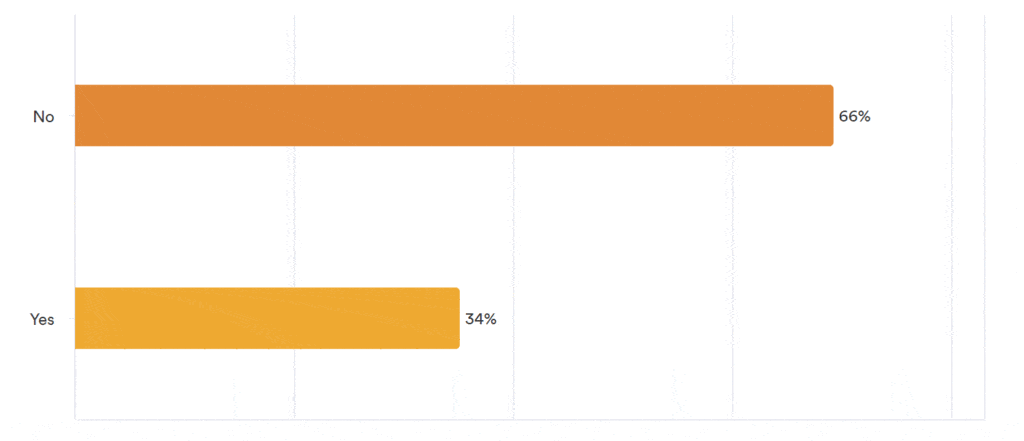According to the May LANDTHINK Pulse results, 66% of respondents feel strongly that a seller SHOULD NOT be obligated to provide a commission for the buyer’s agent in a real estate transaction. When you sell real estate, both your agent and the buyer’s agent get a slice of the pie. A new court verdict could upend how agents get paid, doing away with the traditional agent’s commission of 5-6%. That’s prompting a reckoning for buyers, sellers and real estate agents. Recent federal lawsuits have accused the National Association of Realtors (NAR) and some major brokerages of collusion in an effort to inflate commissions by forcing sellers to make unilateral and non-negotiable offers of compensation to the buyer’s agent for listings on the Multiple Listing Service (MLS), a database run by a cooperative of real estate agents who can share listings with agents at different brokerages.
Last month, the May Pulse asked: Should sellers be obligated to pay the buyer’s agent’s commission in a real estate transaction?

In late October, a federal jury in Missouri found that NAR, HomeServices of America (including Berkshire Hathaway and Intero) and Keller Williams guilty of conspiring to inflate or artificially support high commission rates. This decision arose from the Sitzer/Burnett buyer-broker commission lawsuit. The jury awarded $1.78 billion in damages to the class members, who include sellers of more than 260,000 residential homes in Missouri, Kansas and Illinois from 2015 through 2022.
On March 15, 2024, NAR offered a settlement to resolve a series of lawsuits against the organization. The key issue in the lawsuits was the practice of “tying” commissions whereby MLSs mandate that buyers’ agents be offered a pre-determined commission. This NAR practice dominates the real estate market in the United States, as a large percentage of homes and land sold are listed through a MLS. Tying commissions has been shown to inhibit competition and drive-up fees. To settle that lawsuit, NAR agreed to pay $418 million to people who have sold homes in recent years and must implement two pivotal rule changes.
Rule Change #1: Agents Cannot Offer Broker Compensation on the MLS
When agents list a property on the Multiple Listing Services (MLS) databases, they’ll no longer be allowed to include the buyer agent’s compensation. One of the fields included in MLS listings is for the buyer’s agent commission. It does not, however, prevent sellers from paying the buyer’s agent. Realtors will still have the ability to display compensation information on their personal websites and listings outside of the MLS.
Rule Change #2: Buyers Will Be Required to Sign a Buyer Representation Agreement Before Viewing Property
Buyer agents who are REALTOR® members will be required to enter into written buyer agency agreements with buyers before offering them services, such as showing properties or submitting offers on their behalf. Having clients sign an exclusive buyer representation agreement has always been a good idea. It protects buyers and ensures their agent is working in their best interests, not those of the seller. Furthermore, this agreement must state the compensation agreed upon between the buyers and their agent.
In April, a federal judge preliminarily approved the agreement proposed by NAR to settle the landmark antitrust lawsuits. A final approval hearing is set for November 26.
Since news of the $418 million settlement broke, a wide-ranging conversation through news accounts and on social media has examined the potential impacts, with many experts saying the decision will upend the current system. Others have called foul, claiming the media accounts and commentary are pushing misinformation about the settlement, claiming that compensation for Realtors’ services has always been negotiable.
Technically, commission has always been negotiable, as they have been since the US Supreme Court put a stop to NAR’s rate-setting in 1950. In practice, not so much, because there are strong structural forces at play in the industry. First, MLS associations required listing agents to comply with the commission structure as a condition of putting any property in the database. Meanwhile, agents agreed amongst themselves that they would resist lower commissions anyway. Though it’s always been possible to advertise a commission of less than 2.5% to 3% on the MLS, listing agents have often warned sellers against doing so because buyer agents may “steer” their clients away from properties that advertise lower compensation.
The rule changes, which are set to go into effect in mid-August, represent a major change to the way real estate agents have operated going back to the 1990s, and could lead to buyers and sellers negotiating lower agent commissions.
Buyers have long been blissfully unaware of commissions, with some believing agent services are free. Buyers do pay for commissions because they’re baked into the home’s selling price.
People can say that the seller is not paying the buyer’s commission and that the selling agent is “sharing” their commission with the other side, but the reality is that on the HUD (a document that lists all charges and credits to the buyer and to the seller in a real estate settlement), the commission is broken out to both firms and the seller is paying it from the buyer’s funds – and the buyer never got a say in their half of the paid commission from their funds.
LANDFLIP’s Founder, Ryan Folk, thinks the shake-up has been a long time coming, and believes the real estate industry, commission policies and structures, and NAR policies need a massive overhaul and tech disruption from top to bottom.
“The general attitude in the brokerage community is that change needs to occur. The settlement is an acknowledgment that the old guard must change. One of the most significant impacts of the NAR settlement lies in its promotion of transparency. In our business, transparency is good. It empowers buyers to make more informed decisions about their property purchases.”
According to Folk, this is what needs to happen. Sellers negotiate the commission with their agent and buyers go unrepresented or negotiate their own commission with their agent. If the buyer negotiates a commission with their agent then they can add that fee/commission to the settlement statement (buyer’s side) as part of the deal just like the seller/listing agent does for their commission. And yes, he thinks that buyers may have to finance the commission on their side. So the seller side commission could be 3% and buyer’s side 3% added ON TOP of the sales price to come out of the buyer’s pocket or financed as part of the deal.
“The bottom line is I don’t want half of my commission to go to the other side who is bidding against me the entire time,” Folk said. Let the buyer pay their agent ABOVE the price of the negotiated sale price for their commission.”
The New World Order
With this legal development, the real estate industry witnessed a significant shift for sellers. Agents should inform sellers that they are not obligated to offer any particular amount to the buyer’s agent − or even anything at all. The amount of compensation paid, if any, is up to the seller. Even if the seller chooses not to offer any compensation to the buyer’s agent, the property can still be showcased on the MLS. Buyers will have access to information about all properties available for sale, irrespective of whether the seller offers compensation to the buyer’s agent.
Buyers will have more control over who they hire and how their agent is compensated. Sellers will have more options on how to offer compensation and concessions to incentivize buyers.
Realtors may now be able to compete on commissions, allowing prospective buyers to shop around on rates before they commit to buying a property. Brokers could begin to advertise their fees, allowing customers to choose lower-cost agents.
Sellers will find themselves navigating a more transparent market where commission rates are subject to negotiation rather than being perceived as fixed. While it’s too early to gauge the full impact of these changes, increased transparency is poised to benefit both buyers and sellers in making more informed decisions.
Do you have a suggestion for next month’s Pulse question? Submit your question and we might choose yours!
This content may not be used or reproduced in any manner whatsoever, in part or in whole, without written permission of LANDTHINK. Use of this content without permission is a violation of federal copyright law. The articles, posts, comments, opinions and information provided by LANDTHINK are for informational and research purposes only and DOES NOT substitute or coincide with the advice of an attorney, accountant, real estate broker or any other licensed real estate professional. LANDTHINK strongly advises visitors and readers to seek their own professional guidance and advice related to buying, investing in or selling real estate.










Your poll was terribly worded and likely to get the results you wanted therefore I did not participate. What has been ignored in this debate is that like purchasing any major item (car, house, boat etc) one of the primary determinants of price is how big the payments are and if after down payments, closing and taxes can someone afford it. When costs is shifted to the buyer prices will over time adjust to reflect that and the seller will receive less so that after all is said and done it changes nothing except the attorney fees received in this mess. Experienced buyers that have done their homework know that fees charged, vary by company.
There is no question that some individuals do not need assistance in purchasing and it has never been required. Inexperienced individuals and in particular those not familiar with the area in which they are looking to purchase can certainly make very costly mistakes. Missouri is a buyer beware state so that inexperience can be very costly. Encouraging buyers and sellers to look for the lowest cost option or simply do without assistance will not result in a better experience for anyone but the attorneys lookin to profit from the likely lawsuits that follow.
Dennis, thank you for your response. You saved me from having to make mine. The entire article as you stated was worded terribly – in such a negative way, implying that agents have been taking advantage of sellers. Very frustrating.